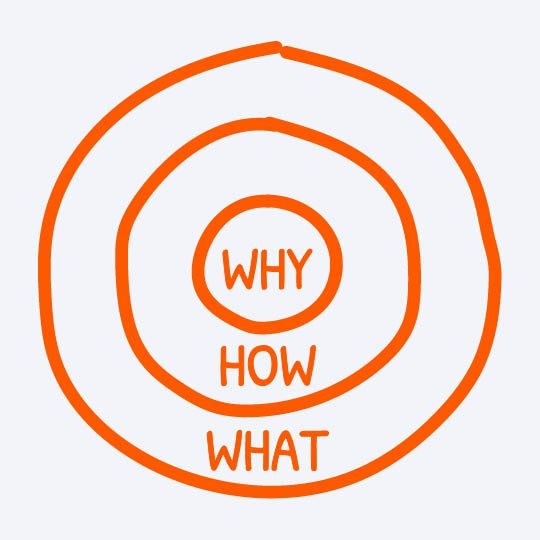Why Start with Why?
written by Ben Reeve
If you’ve had any interaction with the Meridian Agriculture team, you’d know that we will often consider a set of ‘why’ type questions before offering any advice. Why this enterprise? Why this farm? Why this organisational structure? etc. This is to ensure that any advice or recommendations given are reflective of understanding the core motivations of ‘why’ you do what you do. An understanding of ‘why’ provides appropriate focus, clarity and boundaries. Important for consultants, but also others who interact with your business or organisation.
Simon Sinek, an author and speaker on business leadership, created a simple model called The Golden Circle outlining that having an understanding of ‘why’ you do what you do is a vital central point that helps in defining business strategy (how you do things), assists to drive decision-making (what you do), and can have significant impacts on employee engagement through leadership aligned with the ‘why’. Sinek argues that generally people engage with ‘why’ you do what you do: from why you sell what you do, why you create products or services like you do, and why you behave like you do. People connect with your ‘why’.
MODEL DIAGRAM: Link to : https://simonsinek.com/golden-circle/
However defining your ‘why’ can be difficult. Most organisations work from the outside in; understanding what they do, then how they do it, hoping their ’why’ naturally falls out. However working from the inside out, enabling your why to define your how and what provides consistency and opportunities to engage through a common connection. Your why is not about making money. This instead is an outcome of fulfilling it. Your why is better defined by your purpose, the cause or reason you exist, or it may be a core belief in something (i.e. “there are always ways to improve our genetic/pasture/financial performance”).
Your why also has powerful implications for another key part of your business or organisation: people management.
In a competitive recruitment market where skilled and capable people are in short supply, being able to communicate why you do what you do, could set you apart from those who can only articulate what and how they do things. Our anecdotal evidence into decision making from candidates when accepting job offers tells us that they make decisions based on a variety of elements, but being part of something bigger than themselves or knowing they align with an organisations purpose is key to this decision.
Understanding ‘Why’ is equally important in the engagement and motivation of people you employ.
Motivated and engaged employees generally provide more value, effectiveness, and productivity. A clear purpose assists in making decisions quicker, potentially reducing down time and increasing efficiencies. Someone who knows why you do something can find the right ‘what’ or ‘how’ quicker. They as a result feel more engaged in the business themselves.
Sinek states that once you know why you do what you do, you can then answer ‘how’ you do what you do. This is putting your purpose into action and is communicated to employees through the way you plan, prioritise tasks or judge an employees performance. For example if you want to maintain and improve environmental standards across a property, you will ensure that all operations focus on or consider the impact on the environmental assets.
And finally, once you know ‘why’ you do what you do ‘how’ you do what you do, you can understand and focus on ‘what’ you do as a result. A business that decides to operate and have the best possible livestock, genetics condition of animals and paddocks, yet consistently chooses to make decisions on saving money or cost cutting will have some discordance between that intended purpose and what it actually looks like on the ground. Employees will pick up on this. The reality is that whatever you do, allow, or promote; actually becomes viewed as your true purpose. While most employees can be flexible and understand that plans change, engagement to your purpose requires consistency in messaging and behaviour at a high level. This is where leadership is vital.
Your ‘why’ also enables employees to make decisions on whether the business’ purpose is aligned with their own personal purpose. if there is a great divide between your why and an employees why, there is a heightened risk that they will not remain engaged or as an employee for too long. But this shouldn’t concern employers who want employees engaged with the right motivations.
So how to address this?
- Define your why and then communicate why you do what you do. Your employees are not mind readers and reminding them regularly of ‘why’ this business exists is a worthwhile process to invest in.
- Use your purpose as the drafting gate for decision-making. Consistently ask yourself “If we make this decision, is it in alignment with our purpose?
- Get engagement from employees on the ‘how’ and ‘what’. Communicate your purpose and do it regularly. After defining and communicating this, ask employees if what is meant to be happening is actually happening. Ask them if there is anything that can be done to improve connection with the purpose, and are there any workplace practices need to change or adapt? What is missing that can be added into the operations that will help.
Undertaking these three process will further enhance the opportunity for employee engagement and brand as an employer.
Meridian Ag consultants can work with you to define and understand your ‘why’, how it relates to your recruitment and employment practices.

